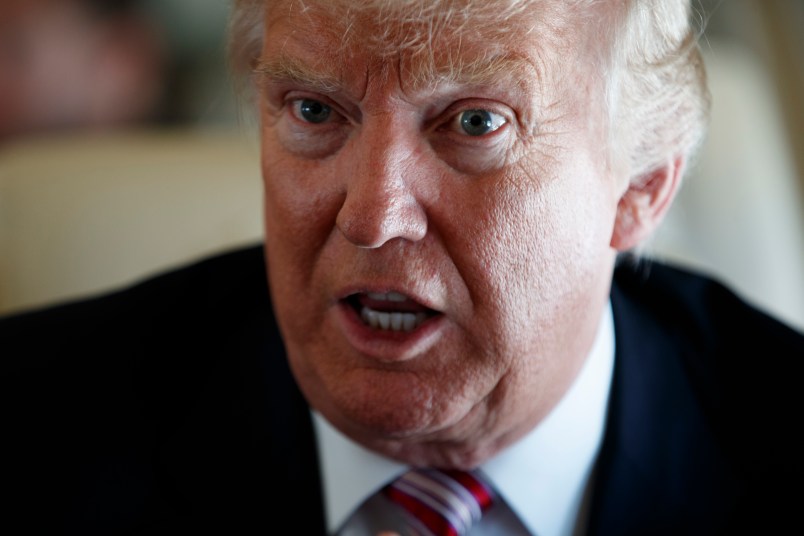Since Donald Trump’s surprise election one month ago, there’s been a bubbling conversation about the mammoth conflicts of interest he will have if he is running or even owning his far flung business enterprises while serving as the head of state. I’ve suggested that the whole notion of ‘conflicts of interest’ doesn’t really capture what we’re dealing with here, which is really a pretty open effort to leverage the presidency to expand his family business. But a couple things came together for me today which make me think we’ve all missed the real issue.
Maybe he can’t divest because he’s too underwater to do so or more likely he’s too dependent on current and expanding cash flow to divest or even turn the reins over to someone else.
Late this afternoon we got news that Trump will remain as executive producer of The Apprentice, now starring Arnold Schwarzenegger. That is, quite simply, weird. The presidency is time consuming and complicated, even for the lazier presidents. Does Trump really need to do this? Can he do it, just in terms of hours in the day? Of course, it may simply be a title that entitles him to draw a check. But does he need the check that bad?
The idea that Trump is heavily leveraged and reliant on on-going cash flow to keep his business empire from coming apart and collapsing into bankruptcy was frequently discussed during the campaign. But it’s gotten pretty little attention since he was elected.
Here’s something else.
After Trump got into that scuffle with Boeing, reporters asked about his ownership of Boeing stock. Trump replied that he’d already sold that stock. So there was no problem. But there’s a bit more to it than that.
According to his spokesman, Trump sold all of his stock back in June, a portfolio which his disclosures suggest was worth as much as $38 million. Trump told Matt Lauer that he sold the stock because he was confident he’d win and “would have a tremendous … conflict of interest owning all of these different companies” while serving as President.
Now, c’mon. Donald Trump sold off all his equities more than six months before he could become president because he was concerned about conflicts of interest? Please. That doesn’t pass the laugh test.
But consider this. During the primaries Donald Trump loaned his campaign roughly $50 million. Over the course of the spring, as it became increasingly likely he’d be the nominee, that loan became increasingly conspicuous. Donors were wary of donating big money because they didn’t want him to use it to pay himself back for that loan. Many suggested that he might not actually be able to part with that money. It became a big issue and Trump refused to forgive the loans.
It was only in June that Trump finally gave in and forgave the loan; this was confirmed in the June FEC disclosure that came out in late July. Who knows why Trump sold off all his stock holdings? Maybe he just had a feeling. Maybe he thought the market was too hot. Maybe he just had a spasm of prospective ethical concern. But let’s be honest. The most obvious explanation is that forgiving that debt from his campaign required him — through whatever mix of contingencies — to free up more cash, either for the campaign or personal expenses or perhaps to have a certain amount of cash on hand because of terms of other debts. It does not seem plausible at all that the timing is coincidental.
Since we don’t have Trump’s tax returns, there’s just a huge amount we don’t know about his businesses. What we do know is that Trump appears to wildly exaggerate the scale of his wealth and exhibit a stinginess that is very hard to square with a man of the kinds of means he claims. A heavily leveraged business, one that is indebted and dependent on cash flow to keep everything moving forward, can be kind of like a shark. It has to keep moving forward or it dies.
Perhaps Trump simply doesn’t feel like he can trust anyone else to keep the whole shambling enterprise afloat. More plausibly, and consistent with Trump’s history over the last couple decades, Trump’s business is dependent on an ever expanding number of deals not just to grow but to stay afloat at all. It is certainly plausible that if Trump simply sold off his company in toto, he’d be in debt. Maybe there wouldn’t be anything left to put in a blind trust.
This is all necessarily speculative because Trump has kept the details of his business empire hidden from the public. But behavior, circumstantial evidence and lots of evidence of tight reliance on cash flow to service debts of various sorts suggest that Trump may not be able to divest or separate himself from his business. Why doesn’t he? Why does he court all this controversy? Because he can’t.
If all this is true, the peril of Trump’s foreign deals is larger than we may realize. It’s not just a matter of hitting the billionaire big time. It could be a matter of staying afloat at all.






